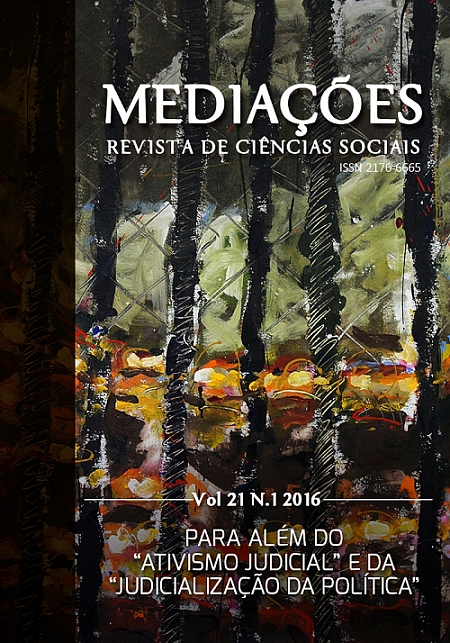Public policy and gender inequality in Brazilian society: considerations from the realms of labor, politics and science
DOI:
https://doi.org/10.5433/2176-6665.2016v21n1p317Keywords:
Gender inequality, Public policy, Politics, ScienceAbstract
The present text focuses on issues of gender inequality and public policy in Brazil today. My major goals are as follows: 1) to provide an analysis of gender inequality in Brazilian society through an examination of the three key arenas of labor, political representation and science and 2) to examine both the advances and the challenges that persist in confronting inequality through public policies on gender. To these ends, I employ secondary data, obtained from three different official sources (IBGE, TSE and CNPq). Lastly, I argue that while the policies that have been implemented can be linked to significant progress in the three above-mentioned arenas, we are still quite far from a real reversal of the current situation of deep inequality, persisting, above all, in the field of political representation.Downloads
References
ARAÚJO, Clara. Ações afirmativas como estratégias políticas feministas. In: BRUSCHINI, Cristina; UNBEHAUM, Sandra G. (Org.). Gênero, democracia e sociedade brasileira. São Paulo: Ed. 34, 2002. p. 143-166.
ARAÚJO, Clara; ALVES, José E. D. Impactos de indicadores sociais e do sistema eleitoral sobre as chances das mulheres nas eleições e suas interações com as cotas. DADOS: Revista de Ciências Sociais, Rio de Janeiro, v. 50, n. 3, p. 535-57, 2007.
BESSE, Susan. Modernizando a desigualdade. São Paulo: EDUSP, 1999.
CENTRO DE GESTÃO E ESTUDOS ESTRATÉGICOS - CGEE. Doutores 2010: estudo da demografia da base técnico-científica brasileira. Brasília: CGEE, 2010. CNPq. Número de mulheres cientistas já iguala o de homens. 2013.
FARAH, Marta F. Gênero e políticas públicas na esfera local de governo. Organizações &Sociedade, Salvador, v. 6, n. 14, p. 65-104, jan.- abr. 1999.
FARAH, Marta F. Gênero e políticas públicas. Estudos Feministas, Florianópolis, n. 12, v. 1, p. 47-71, jan.- abr. 2004.
FRASER, Nancy. Da redistribuição ao reconhecimento: dilemas da justiça na era pós-socialista. In:SOUZA, Jessé (Org). Democracia hoje: novos desafios para a teoria democrática contemporânea. Brasília: Editora UNB, 2001.
GIDDENS, Anthony. Sociologia. Porto Alegre: Penso, 2012.
GOETZ, Ane Mari. The politics of integrating gender to state development processes: trends, opportunities and constraints in Bangladesh, Chile, Jamaica, Mali, Morocco and Uganda. United Nations Research Institute for Social Development United Nations Development, Geneva, 1995.
GROSSI, Miriam P.; MIGUEL, Sonia M. Transformando a diferença: as mulheres na política. Estudos Feministas, Florianópolis, v. 9, n. 1, p. 167-206, 2001.
GUIMARÃES, Nadya.Laboriosas mas redundantes: gênero e mobilidade no trabalho no Brasil dos 90. Estudos Feministas, Florianópolis, v. 9, n. 1, p. 82-102, 2001.
IBGE. Censo demográfico 2010. Disponível em: http://www.censo2010.ibge.gov.br. Acesso em: 2 abr. 2014.
IBGE. Estatísticas de gênero: uma análise do censo demográfico de 2010. Rio de Janeiro, 2014. Disponível em: http://biblioteca.ibge.gov.br/visualizacao/livros/liv88941.pdf. Acesso em: 9 out. 2015.
IBGE. Pesquisa nacional por amostra de domicílios: síntese de indicadores 2008. Disponível em: http://www.ibge.gov.br/home/estatistica/populacao/trabalhoerendimento/pnad2008. Acesso em: 9 abr. 2014.
IBGE. Pesquisa nacional por amostra de domicílios: síntese de indicadores 2009. Disponível em: http://www.ibge.gov.br/home/estatistica/populacao/trabalhoerendimento/pnad2009. Acesso em: 9 abr. 2014.
IBGE. Pesquisa nacional por amostra de domicílios: síntese de indicadores 2010b. Disponível em: http://www.ibge.gov.br/home/estatistica/populacao/condicaodevida/indicadoresminimos/sinteseindicsociais2010/SIS_2010.pdf. Acesso em: 9 abr. 2014.
ILO. Laborsta internet. Genebra, 2010. Disponível em: http://laborsta.ilo.org/. Acesso em: 8 ago. 2010.
LAVINAS, Lena. Emprego feminino: o que há de novo e o que se repete. Dados, Rio de Janeiro, v. 40, n. 1, p. 41-67, 1997.
LETA, Jacqueline. As mulheres na ciência brasileira: crescimento, contrastes e um perfil de sucesso. Estudos Avançados, São Paulo, v. 17, n. 49, p. 271-284, 2003.
LIMA, Michelle P. As mulheres na ciência da computação. Estudos Feministas, Florianópolis, v. 21, n. 3, p. 496, set.- dez. 2013 .
MARSHALL, Thomas Humphrey. Social policy in the twentieth century. 2. ed. Londres: Hutchinson, 1967.
MOGHADAM, Valentine. Transnational feminist networks. International sociology SAGE, London, v. 15, n. 1, 2000.
NASCIMENTO, Janaína Xavier. Para uma teoria da identidade na modernidade: mudanças e permanências à luz do reconhecimento e do feminismo. 2005. 180 f. Tese (Doutorado em Sociologia Política) - Universidade Federal de Santa Catarina, Florianópolis, 2005.
NERI, Marcelo Cortes (Coord.). A nova classe média: o lado brilhante dos pobres. 3. ed. Rio de Janeiro: FGV/CPS, 2010.
SANTOS, Boaventura de Sousa. Por uma concepção multicultural de direitos humanos. In: FELDMAN-BIANCO, Bianco; CAPINHA, Graça (Org.). Identidades: estudos de cultura e poder. São Paulo: Hucitec, 2000.
SCHERER-WARREN, Ilse. Redes de movimentos sociais. São Paulo: Edições Loyola, 1993.
TRIBUNAL SUPERIOR ELEITORAL - TSE. Estatísticas eleitorais 2014. Brasília: TSE, 2014. Disponível em: http://goo.gl/L2aDkX. Acesso em: 13 nov. 2014.
WALBY, Sylvia. Cidadania e transformações de gênero. In: TATAU, Godinho; SILVEIRA, Maria Lucia (Org.). Políticas públicas e igualdade de gênero. São Paulo: Coordenadoria Especial da Mulher, 2004. p. 169-182.
WALBY, Sylvia. Theorizing patriarchy. Oxford: Blackwell, 1990.
Downloads
Published
How to Cite
Issue
Section
License
Copyright (c) 2016 Janaina Xavier do Nascimento

This work is licensed under a Creative Commons Attribution 4.0 International License.
Copyright on articles published in Mediações belongs to the author(s): in the case of partial or entire republication of the original publication, we ask author(s) to indicate the original publication in the periodical.
Mediações uses the Creative Commons Attribution 4.0 International license, which allows Open Access, enabling any user to read, download, copy and disseminate its content so long as adequately referenced.
The opinions expressed by the author(s) are their sole responsibility.
































